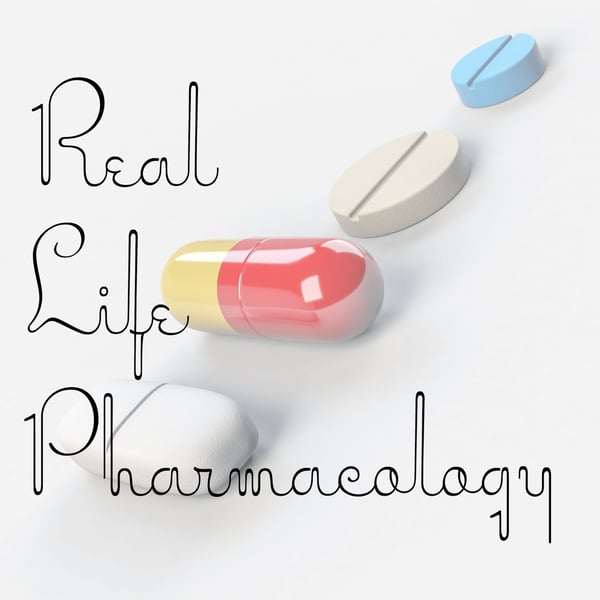Tolterodine Pharmacology
Real Life Pharmacology - Pharmacology Education for Health Care Professionals
Eric Christianson, PharmD; Pharmacology Expert and Clinical Pharmacist
5 • 716 Ratings
🗓️ 18 November 2021
⏱️ 13 minutes
🧾️ Download transcript
Summary
Tolterodine (Detrol) is an anticholinergic medication used to manage the symptoms of overactive bladder.
Tolterodine's anticholinergic activity can lead to a significant number of adverse effects like dry mouth, dry eyes, constipation, and urinary retention.
Elderly patients may be at greater risk for anticholinergic adverse effects from tolterodine compared to younger patients.
Tolterodine can have additive effects from other anticholinergics like diphenhydramine or TCAs which enhance its potential for side effects.
Transcript
Click on a timestamp to play from that location
| 0:00.0 | Hey all, welcome back to the Real Life Pharmacology podcast. I am your host, pharmacist Eric Christensen. |
| 0:06.0 | Thank you so much for listening today. Go check out Real Life Pharmacology.com. |
| 0:12.3 | Snag your free download, 31 page PDF on the top 200 drugs. I throw out important clinical real-world pearls on that educational piece as well as things that you're going to see come up on board exams and pharmacology exams and things like that. |
| 0:29.5 | So a great refresher if you're in practice or if you're in school, definitely a helpful resource to help you study and prepare for any exams you might be facing there. |
| 0:41.6 | So with that said, let's get into the drug of the day today, and that is Tolteridine. |
| 0:48.7 | Brand name of this medication is detrol. |
| 0:52.2 | There is a detrol LA as well. That's a long-acting or extended release product. |
| 1:00.2 | This class of medication, or the class that Tultaridine belongs to is the anticholinergic class, |
| 1:07.1 | and more specifically, it's a urinary anticholinergic. |
| 1:12.2 | And the diagnosis that we're going to most often treat with this medication is overactive bladder. |
| 1:20.2 | So from a mechanism of action standpoint, |
| 1:24.2 | Tultoridine is relatively selective for the inhibition of muscarinic receptors in the bladder and urinary tract area. |
| 1:33.3 | So it can definitely help kind of retain that volume in the bladder, which is going to help you go to the bathroom less, right? |
| 1:46.1 | So reduce that frequency of urination. |
| 1:49.4 | That's the primary goal. |
| 1:50.7 | Reduce symptoms of overactive bladder and symptoms of frequency. |
| 1:55.8 | From a dosing perspective, we've got the immediate release, |
| 1:59.9 | two milligrams twice a day, and then the long |
| 2:02.9 | acting is four milligrams once a day. Obviously, that's an advantage typically to give a medication |
| 2:08.9 | once a day versus twice a day. In my experience, it has been a little bit cheaper to use the |
| 2:16.0 | immediate release, so you might see that. Another |
| 2:19.1 | situation that you might see the immediate released used is in patients maybe that just have |
... |
Please login to see the full transcript.
Disclaimer: The podcast and artwork embedded on this page are from Eric Christianson, PharmD; Pharmacology Expert and Clinical Pharmacist, and are the property of its owner and not affiliated with or endorsed by Tapesearch.
Generated transcripts are the property of Eric Christianson, PharmD; Pharmacology Expert and Clinical Pharmacist and are distributed freely under the Fair Use doctrine. Transcripts generated by Tapesearch are not guaranteed to be accurate.
Copyright © Tapesearch 2025.

